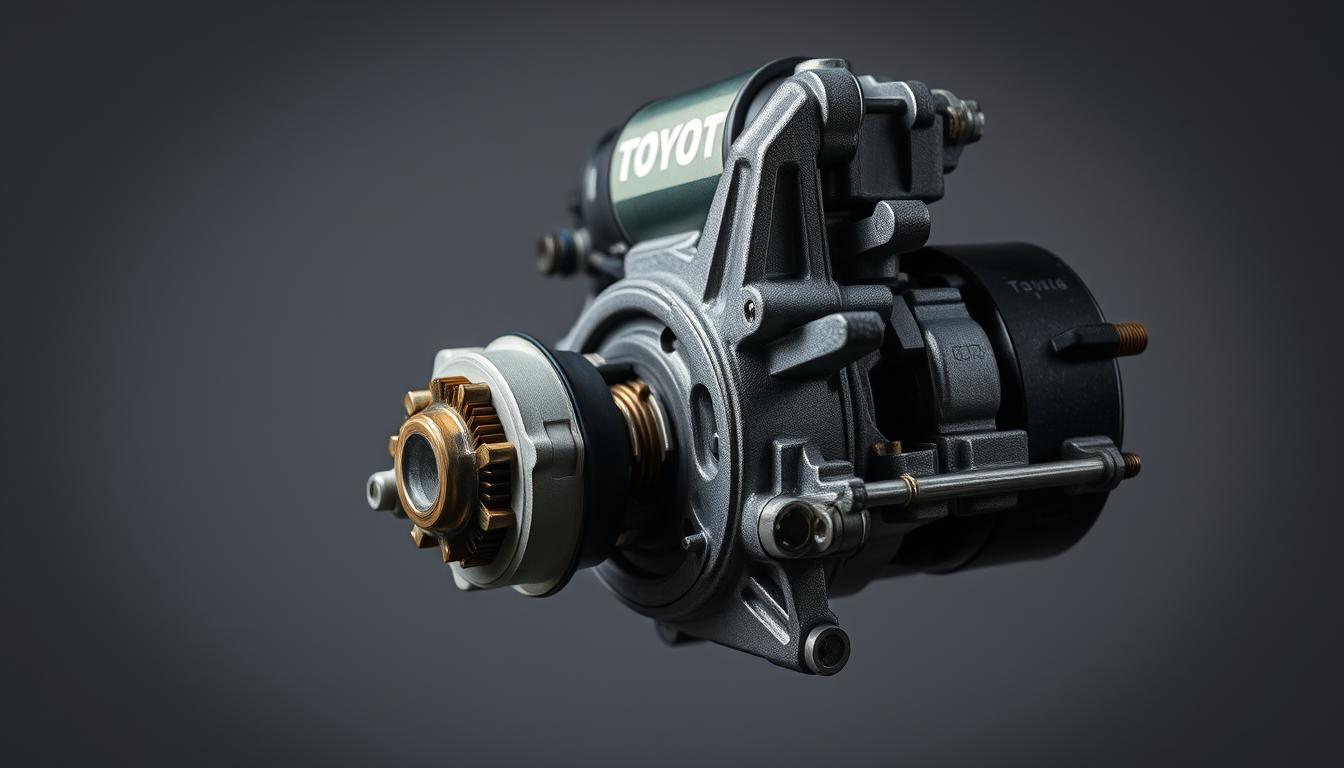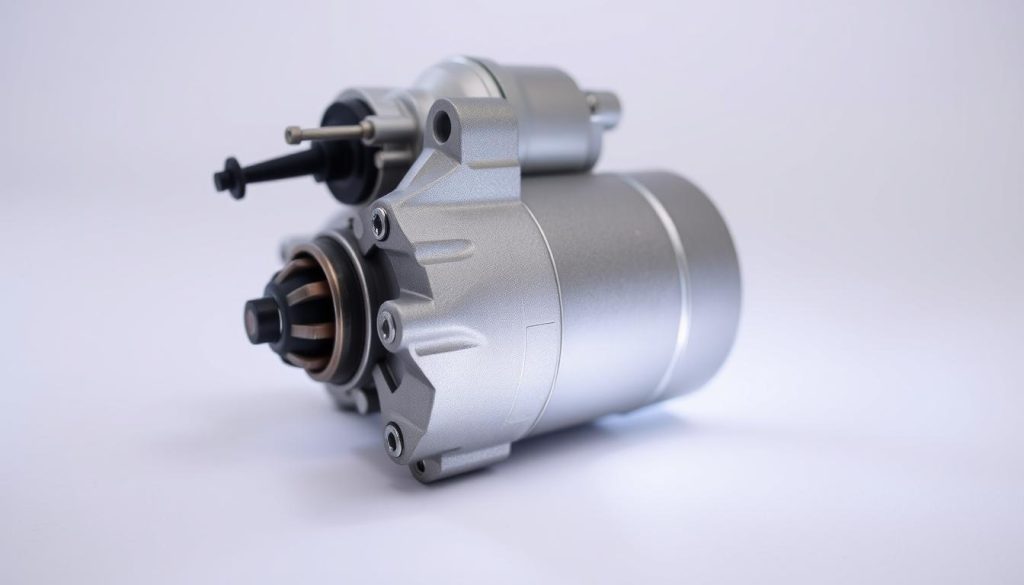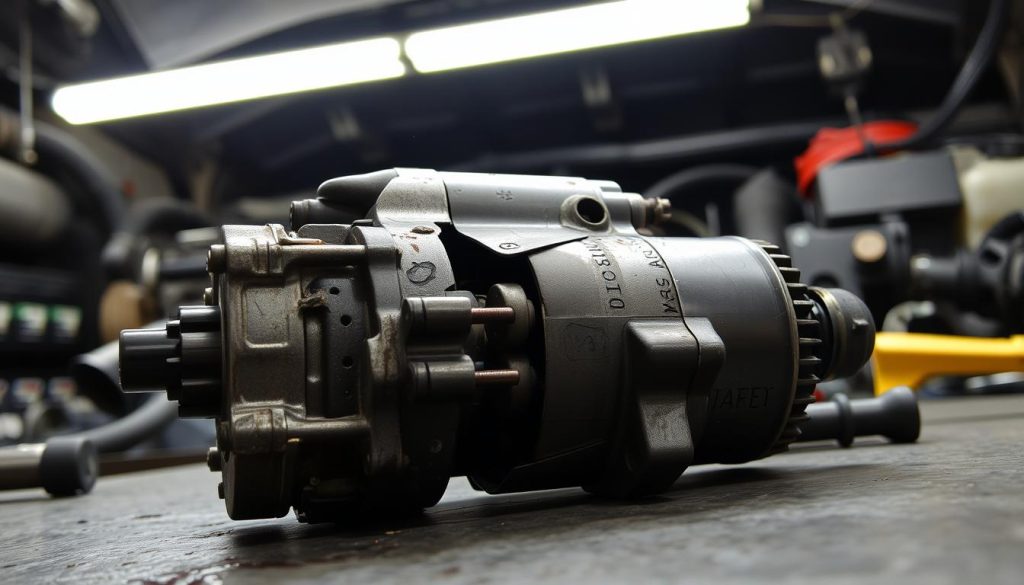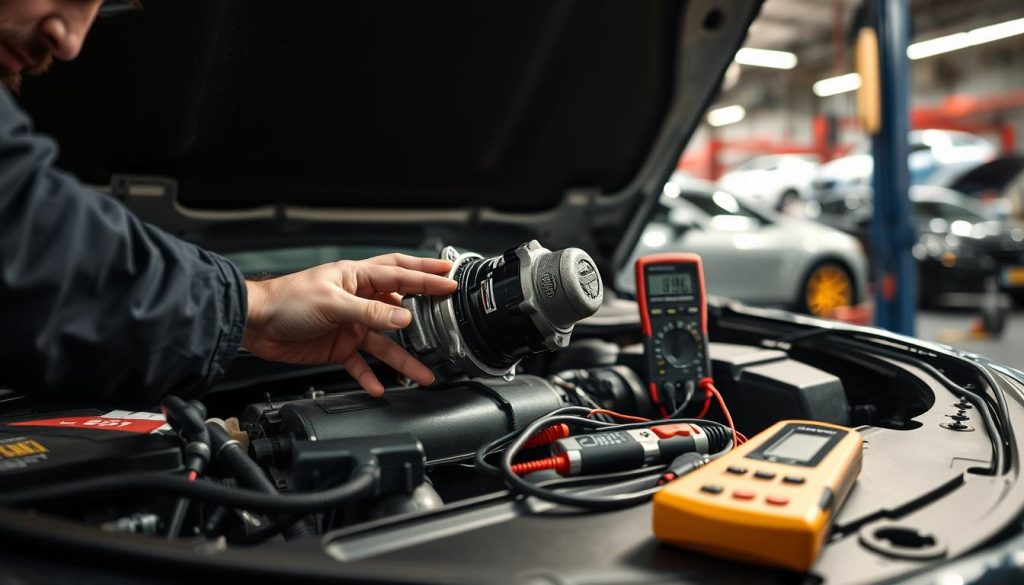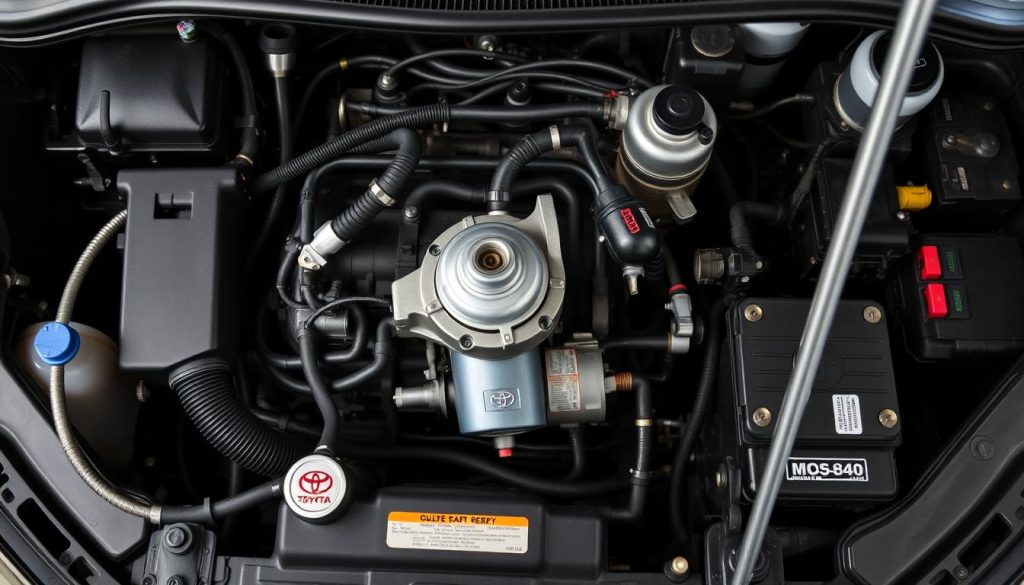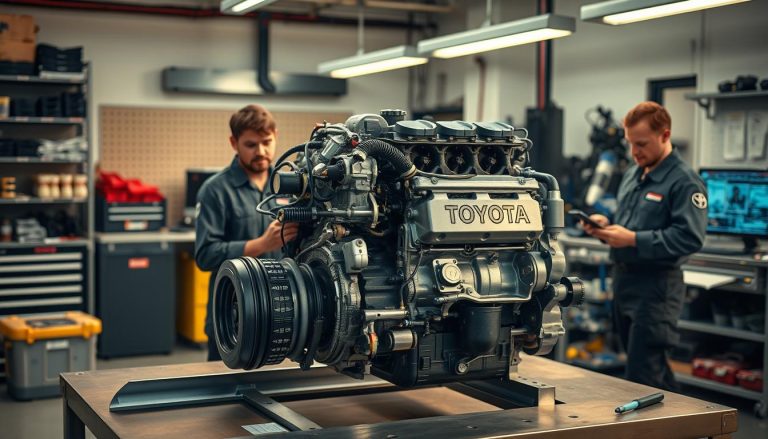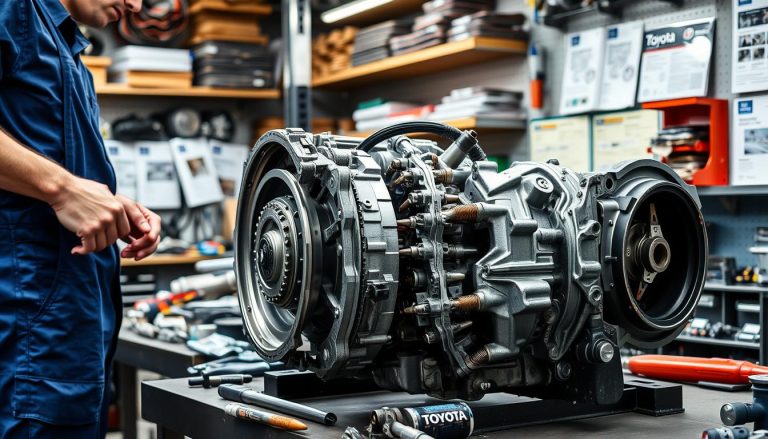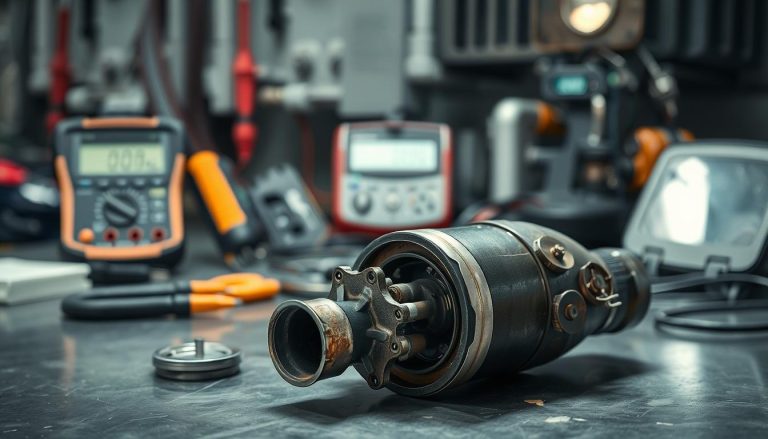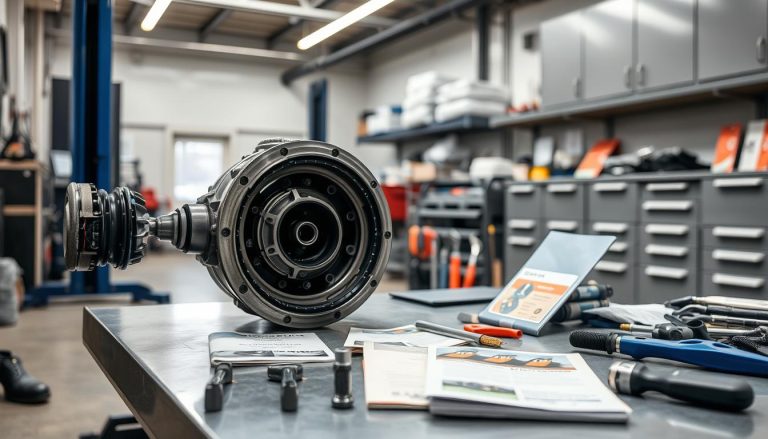Toyota Starter Problems: Troubleshooting Tips
Having trouble with your Toyota’s starter can be really frustrating. It’s even worse when your car won’t start when you need it most. To fix these issues, it’s important to know the signs and what’s causing them. This guide will help you find and fix starter problems, making sure your Toyota is always ready to go.
Dealing with strange noises or constant startup failures can be a hassle. But knowing how to tackle these problems can save you a lot of time and money. Let’s get into the details to keep your car running smoothly.
Understanding the Toyota Starter System
The Toyota starter system is key to starting your car’s engine. Knowing its parts and how they work helps you fix issues. The main parts are the starter motor and the starter relay. They work together to get your car running when you turn the key.
What is a Starter Motor?
The starter motor starts the engine by turning the crankshaft. It gets power from the battery and turns it into movement. A good starter motor is vital for a smooth start.
The Role of the Starter Relay
The starter relay connects the battery to the starter motor. When you turn the key, it lets power flow to the starter motor. This power is needed to start the engine. Without it, starting your car would be hard.
- Make sure to check your starter motor often.
- Look for wear on the starter relay to avoid starting problems.
Knowing how the starter motor and relay work helps you keep your Toyota in top shape. Regular checks and maintenance are key to avoiding problems.
Common Symptoms of Toyota Starter Problems
Spotting Toyota starter issues early can save you from expensive fixes and avoid breakdowns. Here are some common Toyota starter symptoms that suggest it’s time for a check-up.
Strange Clicking or Whirring Sounds
A weird clicking or whirring noise when you turn the key is a clear sign. It means the starter motor might not be working right with the flywheel.
Sporadic Engine Cranking
If your engine sometimes won’t crank or cranks slowly before starting, it’s a red flag. This usually points to worn-out starter parts.
Regular Requirement for Jump-Starting
Often needing a jump-start could mean your starter is struggling. Even if the battery seems fine, the starter might be the problem.
Electrical Complications
Starter troubles can also show up as electrical issues. For example, dimming lights or faulty electronics. These signs suggest the starter is using too much power from the battery.
Sticky Starter Motor
A starter motor that sticks even after starting is a big warning sign. It needs fixing fast to avoid serious damage.
Toyota Starter Not Working: Possible Causes
If your Toyota starter isn’t working, finding the cause can save you time. It also ensures you get the right repair. Issues like loose wiring or dirty connections are common problems.
Loose Wiring to and from the Starter
Loose wiring is a common reason for starter problems. The wires to and from the starter need to be tight. If they’re loose, the starter might not get the power it needs.
This can make the starter work sometimes or not at all. It’s a big problem for your car.
Dirty or Corroded Connections
Dirty or corroded connections are another big issue. Dirt or corrosion on the starter’s electrical contacts can block electricity. This makes it hard for the starter to work right.
Keeping these connections clean can prevent big repairs. It’s a simple step to keep your starter running smoothly.
Toyota Starter Failure Signs
Spotting Toyota starter failure signs early can prevent being stuck without a car. Smoke from the starter is a clear sign of trouble. It usually means the starter is overheating or burning due to electrical problems.
Oil soaking the starter motor is another warning. It shows there’s an oil leak that could make the starter work even worse.
Strange noises when starting the car are also important signs. Clicking or grinding sounds mean there’s a problem with the starter’s mechanics or electricals. Fixing these issues quickly can avoid expensive repairs later.
By watching for these signs, you keep your car running smoothly.
How to Diagnose Toyota Starter Issues
Starter problems can be really frustrating. But, diagnosing Toyota starter problems is easier with a few key steps. By looking at important parts, you can find the main cause and fix Toyota starter troubleshooting issues.
Inspecting the Battery and Cables
First, check the battery and cables. Look for corrosion, loose connections, or worn-out cables. A weak battery or bad connection often causes starter problems.
Use a multimeter to check the battery’s voltage. It should be around 12.6 volts when fully charged. If it’s not, the battery might need a charge or a new one.
Tapping the Starter Motor
This simple trick might fix a faulty starter. Gently tap the starter motor with a tool to re-establish connections. It’s a quick way to see if it works.
Checking the Transmission
A bad neutral safety switch can also cause problems. Make sure your car is in park or neutral. Check the switch for any faults. If it’s bad, replacing it might solve the problem.
By following these steps, you can effectively diagnose Toyota starter problems. Proper Toyota starter troubleshooting helps find the main issue and what to do next.
| Step | Action | Outcome |
|---|---|---|
| Inspect Battery and Cables | Check for corrosion and measure voltage | Identify battery or cable issues |
| Tap Starter Motor | Use a tool to gently tap the motor | Re-establish connections temporarily |
| Check Transmission | Inspect the neutral safety switch | Fix transmission-related starter problems |
How to Fix Toyota Starter Problems
Fixing Toyota starter problems requires both mechanical and electrical skills. Knowing the common issues helps keep your car running well.
Replacing the Starter Motor
Replacing a bad starter motor is often the best fix. Start by disconnecting the battery for safety. Then, remove the wiring and the starter motor.
Install the new starter and reconnect the wiring. Following these steps can save you a lot of time.
Fixing Electrical Complications
Electrical problems, like worn wires or bad connections, can stop your car from starting. Check all wiring for cleanliness and tight connections. Replace any damaged wires.
Fixing these issues is key to solving how to fix Toyota starter problems quickly.
Here is a visual representation to assist you:
How to Start a Car with a Bad Starter
When your car’s starter is bad, you have two emergency options. The tapping method and jump-starting can help get your car running. Let’s look at how to use these methods:
The Tapping Method
The tapping method uses a tool to gently hit the starter motor. This can help if parts are jammed. But, be careful not to hit too hard to avoid more damage.
Jump-Starting the Vehicle
Jump-starting can give your car a power boost from another battery. This might help if your starter is weak. Always connect jumper cables right to avoid damage.
Here’s a quick comparison of both methods:
| Method | Procedure | Ideal Scenario |
|---|---|---|
| The Tapping Method | Tap the starter motor lightly | Sticking or jammed starter components |
| Jump-Starting the Vehicle | Use jumper cables to boost battery power | Battery power is insufficient due to weak starter |
Using these methods can be a lifesaver in emergencies. But remember, they’re only temporary fixes. Get your car checked by a pro as soon as you can.
Preventive Maintenance Tips for Toyota Starters
Regular Toyota starter maintenance can make your car’s starter last longer. It also stops unexpected breakdowns. Here are some key tips to keep your starter working well:
- Regular Inspections: Check the starter often for wear and tear. Look for frayed wires or loose connections that could cause problems.
- Cleanliness: Keep the starter motor clean and free of dirt. Dirt can cause mechanical issues and make your starter less efficient.
- Corrosion Prevention: Check electrical connections for corrosion often. Clean them with a wire brush and use an electrical contact cleaner to keep them working well.
- Performance Monitoring: Watch how your starter performs. If it cranks slowly or acts strangely, it might need maintenance or repairs.
Following these preventing Toyota starter problems steps helps your car start reliably. It also saves you from expensive repairs later. Keeping up with Toyota starter maintenance is essential for a long-lasting starter system.
Why Your Toyota Starter Might Smoke
Seeing your Toyota starter smoke is alarming and needs quick action. It usually means there are big *Toyota starter problems* that need fixing fast.
Electrical issues are a common reason for starter smoking. Too much current can make the starter motor overheat. This overheating can happen if the motor is failing to work right.
Old or damaged wiring is another cause. Faulty wiring can cause short circuits, leading to overheating and smoke. This problem not only affects the starter but can also cause bigger electrical issues in your car.
Starter motors can also smoke if they’re always under strain. This can happen from driving in stop-and-go traffic or trying to start a car that’s not running well. This strain can wear out the starter over time.
It’s very important to fix these *Toyota starter problems* right away. This helps avoid more damage to your car and keeps you safe. Regular checks, replacing worn-out parts, and quickly looking into any problems are key steps to avoid these issues.
The Impact of Oil Leaks on Your Toyota Starter
Oil leaks can really hurt your Toyota starter’s performance. When oil gets into the starter motor, it causes big problems. It messes with electrical connections, increases resistance, and can even make the starter fail.
Oil leaks also damage the starter’s internal parts. The oil mixes with dirt and grime, creating a sludge. This sludge messes with the gear mechanism and bearings, making the starter work poorly or not at all.
Also, oil leaks make fixing starter problems harder. When checking the starter, you need to clean off any oil. Sometimes, oil damage is so bad that you have to replace the starter to get it working right again.
To avoid these problems, it’s important to check for oil leaks often and fix them quickly. Taking care of oil leaks early can save you from expensive repairs and keep your starter system running well.
- Regularly inspect the engine for any signs of oil leakage.
- Ensure proper sealing of gaskets and oil pan to prevent leaks.
- Clean the starter area during routine maintenance checks.
- Address any oil leaks promptly to avoid contamination of the starter motor.
By being careful and proactive, you can avoid big starter problems and keep your vehicle’s starter system running longer.
Recognizing Early Signs for Starter Repair
Spotting the early signs of Toyota starter problems is key to fixing them quickly. Look out for signs like the car starting sometimes but not always. Also, listen for odd noises like grinding or clicking sounds.
These could mean your starter might fail soon. Electrical problems, like dim headlights or a flickering dashboard, are also warning signs. These issues might mean you need a Toyota starter repair.
By catching these signs early, you can fix your starter before it gets worse. Knowing these symptoms helps you keep your car running smoothly. It’s a step towards making sure your vehicle stays reliable.
When to Consult a Professional Mechanic
Even with your best efforts, some Toyota starter problems might need a pro’s help. Signs like engine cranking issues or needing jump-starts often mean it’s time to call a mechanic. Complex electrical problems also point to the need for expert advice.
Importance of Regular Inspections
Regular checks on your Toyota starter are key to keeping your car in top shape. A professional mechanic can spot small issues before they become big problems. This saves you time and money in the long run.
Choosing the Right Repair Shop
Finding a good repair shop is important for quality service. Look for certified Toyota experts to inspect your starter. They’ll fix your issues right, keeping your car running smoothly for years.
Conclusion
Fixing Toyota starter problems is key to keeping your car running well. Knowing how the starter system works helps a lot. It lets you spot and solve issues before they get worse.
Preventing problems is also important. Look out for loose wires or corrosion. Regular checks and catching signs early can save you a lot of trouble and money.
If you’re stuck or unsure, don’t hesitate to get help from a mechanic. They can offer expert advice and solutions. With the right care, your Toyota will keep running smoothly for many years.
FAQ
What is a Starter Motor?
The starter motor is a key part of your Toyota’s starting system. It uses the vehicle’s battery to start the engine. When you turn the ignition key, it turns the engine over, letting it run.
The Role of the Starter Relay
The starter relay connects the battery to the starter motor. It makes sure power gets to the motor. This lets the starter motor work right and start the engine.
What could cause strange clicking or whirring sounds when starting my Toyota?
Strange sounds when starting can mean starter motor problems. These sounds can come from a weak battery, a bad starter motor, or electrical issues like loose connections.
Why is my Toyota’s engine cranking sporadically?
If your engine cranks on and off, it might mean the starter motor is failing. Or, there could be electrical system problems. Issues like loose wiring or a weak battery can stop the engine from cranking smoothly.
What are common reasons for frequent jump-starts required for my Toyota?
Needing to jump-start your car often can mean starter system problems. These problems could be a failing starter motor, a weak battery, or bad electrical connections. These issues can make starting your car hard.
What electrical complications can affect my Toyota’s starter?
Electrical problems like loose wiring, corroded connections, and faulty starter relays can affect the starter. These issues can stop power from reaching the starter motor, causing starting problems.
What does a sticky starter motor mean?
If your starter motor stays engaged after the engine starts, it might be a sign of a problem. This could mean mechanical issues with the motor or related parts. You should get it checked right away to avoid more damage.
What could cause loose wiring to and from the starter on my Toyota?
Loose wiring can happen due to vibration, wear, or bad installation. It can mess up the electrical flow to the starter motor. This might cause starting problems.
How can dirty or corroded connections affect my Toyota’s starter?
Dirty or corroded connections can block the electricity needed for the starter motor. This can make starting the engine hard or even stop it from working.
What are some signs of a failing Toyota starter?
Signs of a failing starter include odd noises when starting, smoke from the starter, and oil-soaked parts. Spotting these signs early can help avoid bigger problems.
How do I diagnose Toyota starter issues?
To find starter problems, check the battery and cables, tap the starter motor, and look at the transmission’s safety switch. These steps help find the exact problem in the starter system.
How can I fix Toyota starter problems?
To fix starter issues, you might need to replace the starter motor and fix electrical problems like worn wires. Keeping these parts in good shape makes your starting system reliable.
How can I temporarily start my Toyota with a bad starter?
You can start your car by tapping the starter motor to free stuck parts or by jump-starting it. These methods might help you get to a repair shop for a proper fix.
What are some preventive maintenance tips for Toyota starters?
To keep your starter in good shape, do regular checks and cleanings. Make sure electrical connections are tight and clean. Also, watch how the starter is working. These steps help catch problems early.
Why might my Toyota starter be smoking?
If your starter is smoking, it could be due to electrical issues like overloaded circuits or a failing motor. You need to fix it right away to avoid more damage and keep your car safe.
How do oil leaks impact my Toyota starter?
Oil leaks can really hurt your starter’s performance, leading to malfunctions and failure. Checking for and fixing oil leaks can protect your starter system.
What are the early signs for Toyota starter repair?
Early signs include problems with starting, strange noises, and electrical issues. Spotting these symptoms early can help fix problems before they get worse.
When should I consult a professional mechanic for my Toyota starter problems?
If starter issues keep happening after basic checks, it’s time to see a professional mechanic. Regular checks by a pro can prevent big problems. A good repair shop ensures your car is fixed right and works well.

